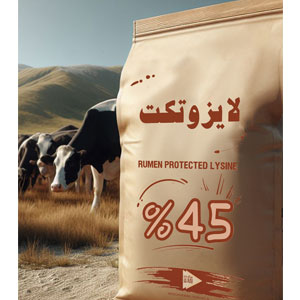A new approach to increase the productivity of ruminants
Ruminants such as cattle, sheep and goats play a vital role in world food security and are the main source of protein and dairy products for human consumption. However, production efficiency in ruminants is often limited by the unavailability of essential amino acids, especially lysine, in the rumen.
Lysine is a limiting amino acid in the diet of ruminants, and its deficiency can disrupt protein synthesis and lead to a decrease in feed protein yield, milk production, and an increase in animal weight.
Importance of animal lysine lysotech in feeding ruminants
Lysine is an essential amino acid that plays an important role in protein synthesis, milk production and growth in ruminants. Lysine also plays a role in the regulation of various physiological processes from immune system function to reproductive function. In ruminants, lysine in feed is broken down in the rumen by microbial enzymes. Ruminal degradation of lysine is rapid and results in significant loss of this essential amino acid.
A new approach to increase the productivity of ruminants
Ruminants such as cattle, sheep and goats play a vital role in world food security and are the main source of protein and dairy products for human consumption. However, production efficiency in ruminants is often limited by the unavailability of essential amino acids, especially lysine, in the rumen.
Lysine is a limiting amino acid in the diet of ruminants, and its deficiency can disrupt protein synthesis and lead to a decrease in feed protein yield, milk production, and an increase in animal weight.
Importance of animal lysine lysotech in feeding ruminants
Lysine is an essential amino acid that plays an important role in protein synthesis, milk production and growth in ruminants. Lysine also plays a role in the regulation of various physiological processes from immune system function to reproductive function. In ruminants, lysine in feed is broken down in the rumen by microbial enzymes. Ruminal degradation of lysine is rapid and results in significant loss of this essential amino acid.
*Benefits of animal lysine lysotech
- Improved growth performance: The use of protected lysine has been shown to increase growth rates in ruminants, especially in young animals. This is attributed to increased availability of lysine for protein synthesis, leading to increased muscle growth and development.
2 Increasing milk production: With new research, it has been determined that the use of protected lysine in animal feed increases milk production and improves milk protein content. This is due to the increased availability of lysine for milk protein synthesis.
3 Improving reproductive performance: In many articles, the role of protected lysine in improving the reproductive performance of ruminants has been mentioned, including increasing the fertilization rate and reducing fetal mortality.
4 Increasing immune function: Lysine plays a role in regulating immune function and has been shown to increase immune responses in ruminants, which leads to improved health and reduced incidence of disease.
5 Increasing the efficiency of nitrogen use: It has been found that protected lysine improves the efficiency of nitrogen use in ruminants, reducing nitrogen excretion and environmental pollution.
result
Rumen-protected lysine is a new additive that has the potential to increase ruminant productivity and feed efficiency. By delivering lysine to the small intestine, growth performance, milk production, reproductive performance and immune function can be improved in ruminants. The mechanisms of action of lysotech livestock lysine include increasing livestock access to lysine, increasing protein synthesis and reducing feed costs.


